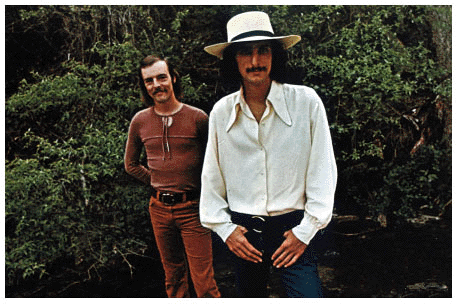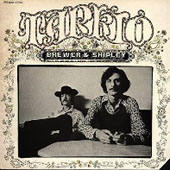|
Brewer & Shipley Kama Sutra 516 April 1971 Billboard: #10
"People are always asking, 'Geez, what was the meaning of it? Was it a drug song?" Mike Brewer said in an exclusive interview. "I always look 'em in the eye and ask 'em, 'Come on, have you ever been one toke over the line; done one hit too many?' Yeah, it's about any drugs, or anything that you push too far. A toke seemed apropos at the time. And at that time, I'd had one too many hamburgers, one too many Holiday Inns, one to many nights on the road: toots, tokes, everything."
Luckily for Brewer and Shipley, their paths crossed one smoggy Los Angeles night. Immediately, they began writing together and recording demos for Good Sam Music. In 1968, A&M issued their incomplete tracks as an album (Down in L.A.) without permission, so the duo actively sought out a firm recording contract. Kama Sutra obliged. "One Toke Over the Line," with Mark Naftalin on keyboards and Grateful Dead's Jerry Garcia on pedal steel guitar, was the opening cut from their second Kama Sutra LP, Tarkio (1971). "The song came about by chance, in a dressing room, one night," Brewer recalled. "We'd had one too many and just broke into song. We were just kiddin' around, not tryin' to write a song or anything. Neil Bogart (the founder of Buddah and later Casablanca Records) heard us do the number as an encore, at a show. He said it was a natural and had to be our next single." Over the next couple of years, a few more countrified albums appeared, and two more singles -- "Tarkio Road" (#55, 1971) and "Shake Off the Demons" (#98, 1972) -- won positions on the Billboard Hot 100. Mike, Tom, and their families lived on a farm outside of Kansas City. Into the '80s they continued to tour, to eat hamburgers, and to stay at Holiday Inn. Michael Brewer's 1983 release, Beauty Lies, was produced by Dan Fogelberg and received favorable reviews, but has never been released on CD. Shipley, meanwhile, turned his attention to working as a studio engineer; most successfully on Joni Mitchell's albums Dog Eat Dog, Chalk Mark on the Rainstorm and Night Ride Home. Brewer died at his home near Branson, Mo., on December 17, 2024, at the age of 80. Shipley lived in Rolla, Mo., where he was part of the staff of Missouri University of Science & Technology (formerly the University of Missouri - Rolla). He was also a manager of video productions for the university. He was a member of Engineers Without Borders and traveled twice to the Amazon and Andes of Bolivia to produce videos for the organization. Shipley died on August 24, 2025, at the age of 84. - Wayne Jancik, The Billboard Book of One-Hit Wonders, Billboard, 1998. |


